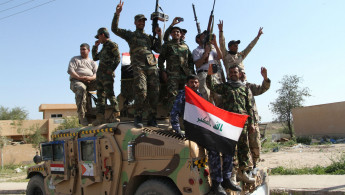Battle for Tikrit tests Iran's abilities
Iraqi Prime Minister Haider al-Abadi is trying to set the hands of his watch ahead this time around in the fight with the Islamic State group, instead of trying to right the wrongs of his predecessor Nouri al-Maliki.
Abadi has confronted IS with a surprise attack on Tikrit, which is not part of the US plan made by the team of US military advisers working in Baghdad since last September.
Officials in the Pentagon have said Abadi planned the campaign without informing US military commanders or coalition forces. The US news website, The Daily Beast, reported a US official as saying the attack to retake the city from IS is being done with the help of the Iranian military.
Although the large-scale attack on Tikrit has been going on for days, there has not been any significant advances so far. About 25,000 soldiers are taking part from the military, police, pro-government Shia militias and troops from the Iranian revolutionary guard led by Qasem Soleimani, mostly from the Hidden Imam squad, which is usually assigned to special tactics, and urban combat.
The Iraqi government has banned the militias from using sectarian slogans and banners in an attempt to give the battle a purely nationalistic tone to distance itself from any sectarian alignment. Iraq's sate-run al-Iraqiya television station has been playing patriotic songs for hours that glorify the army and use the phrase, "We will liberate our land with our blood."
RELATED: Thousands of civilians flee fighting in Tikrit.
In the first hours of the attack, Abadi changed the name of the mission from "Revenge for the Speicher martyrs"- a reference to the 1,700 soldiers killed by IS in Camp Speicher located between Beiji and Tikrit - to "At your service, messenger of God."
Iraqi military leaders and politicians yesterday said it was possible the operation would go on for several days or weeks, revealing the intensity of the fighting and the determination of the IS to not fall apart in Iraq.
IS released a video yesterday of hundreds of their fighters arriving in Tikrit from Syria and Mosul to bolster what the group described as "the city's security" and to fight the "greedy off the lands of the Islamic State".
Iran has used its Arabic-language social media accounts to support its military campaign by posting constant updates. Also the Iranian state run Arabic television stations al-Alam and the Islamic Dawa Party's Afaq launched the Arabic hashtag "Our Men in Tikrit".
Southern tribal leader Sheikh Hussain Mijbas al-Zubaidi told al-Araby al-Jadeed: "So far we have received the bodies of 71 young men from the south brought to us in trucks. The young men were killed in Tikrit, al-Alam and Baiji just in the past three days."
"This is not our war. The cities' residents are fleeing to camps and the government expects us to sacrifice our young people. The government has to stop throwing away the lives of our young people in west and north Iraq. Everyone has to clean up their own homes and not wait around for someone to clean it for them."
The current course of the battle seems to be leading to two possible scenarios. If the attack fails and the Iraqi army, militias and Iranian forces cannot retake the city it will show the Iraqi government's inability to rid the country of IS.
If the government fails to enter Tikrit, which is only about a third the size Mosul, then what is the situation going to look like in Mosul or even the cities in Anbar province?
A scenario that would embarrass Abadi in front of his partners in the National Iraqi Alliance, in particular the pro-Iranian wing such as the State of Law Coalition led by Nouri al-Maliki, is if he officially asks the US military to come back to Iraq to solve the problem.
This will not happen before the end of the year at the latest for reasons related to Americans themselves because they would pave the way for their forces with an intense air campaign throughout Iraq that would grind down IS' troops and let the marines come in to finish them off.
| If the government fails to enter Tikrit, then what is the situation going to look like in Mosul? |
This possible scenario would embarrass the opponents of US presence in the National Iraqi Alliance, therefore Iran will be interested in succeeding in the battle in Tikrit by any means to firstly strengthen its influence in Iraq and secondly to prove Iraq's future does not need western intervention.
Tehran for the first time has announced in its state-run Fars news agency that Soleimani has arrived in Tikrit to play a support role, not to command the battle.
He will strive to make the attack a success and regain full control of Tikrit and the cities in Salaheddin province, to open up Iran's appetite to attack Mosul and the cities in Anbar province and further cripple IS.
But the expected scenario in Iraq if the attack is a success will be indirect cooperation between the US and the Iranians in Iraq through the Iraqi government as an intermediary, while the US will keep its weight in Iraq and increase it gradually with air support.
This means the war will go on for longer, possibly until the end of 2017, which of course Baghdad does not want. A success in Tikrit will not necessarily mean successes in Mosul and Anbar, meaning the option of the "saviour" US entering the ground battle will remain possible.
This is an edited translation of the original Arabic.



